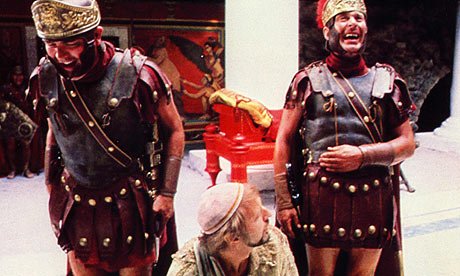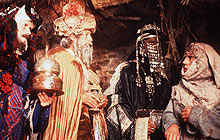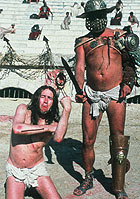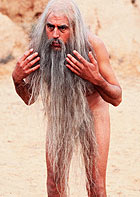A partir de una serie de analissis del Guardian sobre la compatibilitat del relat, l'atrezzo, els personatges amb el contexte històric.
Life of Brian: birth, blessings and blasphemy
Monty Python's comedy about an ordinary man being mistaken for the messiah makes us look on the bright side of life – and gives us a fairly accurate portrayal of first-century Judea
-

- guardian.co.uk, Thursday 25 December 2008 09.39 GMT
- Article history

Scenes of Roman life: Monty Python's The Life of Brian. Photograph: Kobal
Director: Terry Jones
Entertainment grade: A
History grade: C
- Life Of Brian
- Release: 1979
- Country: UK
- Cert (UK): 15
- Runtime: 93 mins
- Directors: Terry Jones
- Cast: Eric Idle, Graham Chapman, John Cleese, Michael Palin, Terry Gilliam, Terry Jones
Monty Python's Life of Brian follows the story of Brian Cohen, a half-Roman, half-Israelite man, living in Judea in AD 33, on a Saturday afternoon, at around teatime. Brian is a snack vendor and member of the anti-Roman resistance, and is shown to live contemporaneously with Jesus of Nazareth.
People

The film opens with three wise men from the orient arriving in a stable to bestow gifts of gold, frankincense and myrrh on a newborn baby. The scene is based on the account of Jesus' birth in the gospel of Matthew, though Matthew does not record a mishap whereby the magi accidentally bestow their gifts on Terry Jones in a dress. As for non-biblical first century sources, they too are curiously silent on the matter. It must be admitted that there is little evidence for the existence of the historical Brian. However, it is considered acceptable in academic circles to view Monty Python as fiction.
Justice

Brian and his mother are trying to listen to Jesus speak, but from the back of the crowd it's hard to hear. Following some confusion – "Blessed are the cheesemakers?" – they go instead to watch a man being stoned for blasphemy. Though stoning was not a legal punishment in Greek or Roman law, it was one of the four forms of capital punishment in the Jewish criminal code, along with decapitation by sword, strangulation, and being made to drink molten lead. As the film correctly hints, stoning was extremely popular with angry mobs. The Bible advises stoning for, among other offences, being a wizard, touching Mount Sinai while Moses receives the ten commandments, rebelling against your parents, or goring someone to death, if you are an ox. Further to this, stoning was often carried out summarily against traitors, and bad actors.
Education

Having joined the People's Front of Judea (rejecting the rival Judean People's Front), Brian is sent in the middle of the night to write "Romans go home" on the governor's palace. As he is scrawling the words "Romanes eunt domus," a centurion apprehends him. "What's this, then?" he barks. "People called Romanes, they go, the house?" Incensed, he grills Brian on the Latin grammar, finally achieving the correct "Romani ite domum". Genuine examples of contemporary graffiti, best preserved at Pompeii from AD 79, reveal that even native Latin speakers had trouble with the complexities of case and declension. They also reveal a lot of filthy gossip about prostitutes and gladiators but, seeing as that is not strictly relevant to the film, interested readers will just have to look it up for themselves. It certainly makes the later joke about a Roman called Biggus Dickus seem very much in keeping with the humour of the first century.
Imperialism

Despite a long and mostly historically accurate list of things the Romans did for us (sanitation, roads, irrigation, medicine, education, viticulture, public order and peace), the People's Front of Judea continues its campaign to drive them out. Misfortune prevails, and Brian is captured, then sentenced to be crucified. Worse yet, he's crucified next to Eric Idle playing a cheeky local prankster. The prankster can't resist regaling Brian with anecdotes about his brother. "Randy little bugger. Up and down like the Assyrian Empire." The Assyrian Empire, though it did fluctuate in strength, had gone down finally over six hundred years before this scene is set. Making the joke old in AD 33, but not inaccurate.
Verdict

Bearing in mind that the Pythons probably didn't have historical truth at the absolute top of their agenda, The Life of Brian gives a surprisingly respectable nod towards first-century Judea. The Tunisian locations make a good substitute for the Holy Land, the sets and costumes – aside from in the brief scene where Brian is kidnapped by aliens – are convincing, and there's a commendable feel for the contemporary sense of popular resentment against the Roman Empire. Historically speaking, there's no reason to stop looking on the bright side of life.
Cap comentari:
Publica un comentari a l'entrada